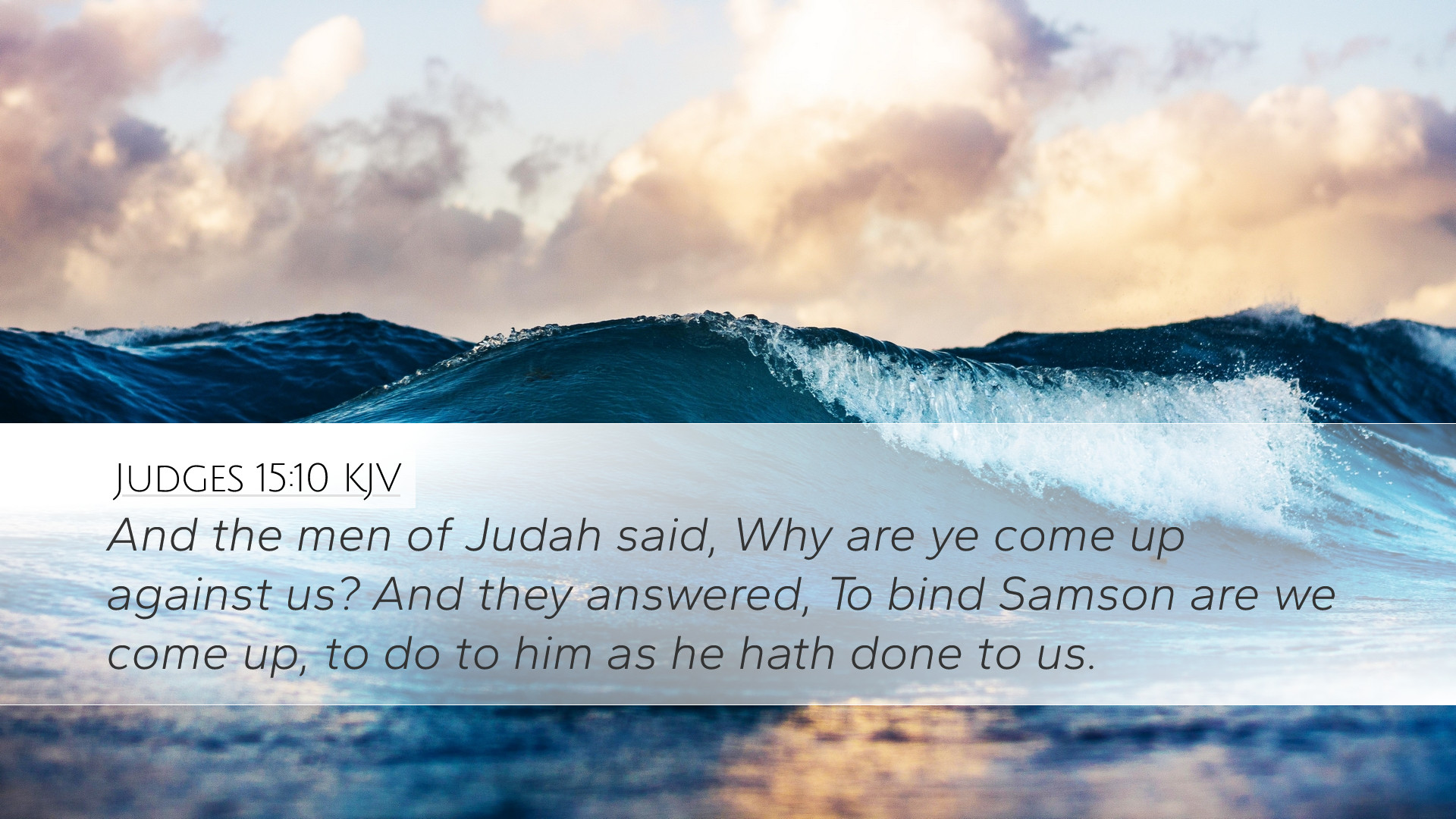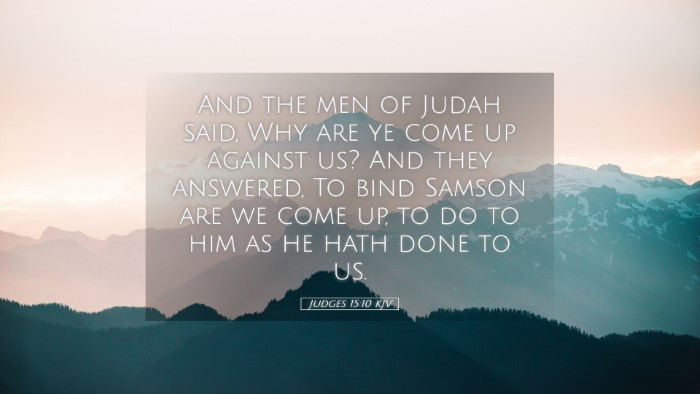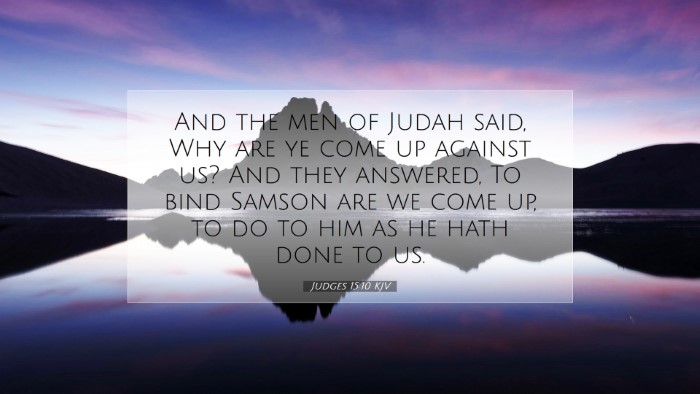Old Testament
Genesis Exodus Leviticus Numbers Deuteronomy Joshua Judges Ruth 1 Samuel 2 Samuel 1 Kings 2 Kings 1 Chronicles 2 Chronicles Ezra Nehemiah Esther Job Psalms Proverbs Ecclesiastes Song of Solomon Isaiah Jeremiah Lamentations Ezekiel Daniel Hosea Joel Amos Obadiah Jonah Micah Nahum Habakkuk Zephaniah Haggai Zechariah MalachiJudges 15:10
Judges 15:10 KJV
And the men of Judah said, Why are ye come up against us? And they answered, To bind Samson are we come up, to do to him as he hath done to us.
Judges 15:10 Bible Commentary
Commentary on Judges 15:10
The text reads: "And the men of Judah said, Why are ye come up against us?"
Introduction
This verse occurs within the narrative of Samson, a judge of Israel, known for his extraordinary strength and troubled relationship with the Philistines. The context of Judges 15:10 highlights the tension between the tribe of Judah and their captors. This commentary synthesizes insights from well-regarded public domain sources to unpack the theological and historical implications of this verse.
Contextual Background
The period of the Judges was marked by a cyclical pattern of sin, oppression, supplication, and deliverance among the Israelites. Judges 15 describes the aftermath of Samson's conflict with the Philistines, particularly focusing on the repercussions of his actions on the tribe of Judah.
Judah’s Response
The men of Judah's inquiry, "Why are ye come up against us?" serves as an essential pivot for understanding their political and relational dynamics with the surrounding Philistine oppression.
- Fear of Retaliation: The men of Judah express concern over their safety. Their question reflects an awareness of the dangers posed by the Philistine forces and a fear of being implicated in Samson's defiance.
- Reluctance to Engage: This response also indicates their ambivalence towards Samson's leadership. Rather than rallying to support a national hero, they seem to prioritize self-preservation and their own social contracts.
Theological Reflections
The verse compels readers to contemplate themes of leadership, responsibility, and community. Here, the questioning by Judah signifies understanding the corporate consequences of individual actions. Pastors and theologians might draw parallels to communal dynamics and the church’s response to internal challenges.
Key Theological Insights
- Collective Identity: Judah’s question emphasizes the shared identity of the Israelites. Their fate is tied to Samson's, and they perceive his exploits as jeopardizing their security.
- Divine Providence: The entire episode can be viewed through the lens of God’s sovereignty, as He raises unconventional leaders like Samson, but this also leads to unpredictable outcomes for the community.
- Moral Ambiguities: The moral complexities demonstrated in this verse compel interpreters to consider the nature of sin and its widespread ramifications, thereby challenging simplistic interpretations of heroism and villainy.
Commentary Insights
Matthew Henry
Henry notes that the response of Judah encapsulates a broader reluctance to deal with the Philistines, reflective not only of their fear but also of their dependency on God's deliverance rather than human instruments. He accentuates the irony that Judah’s own deliverer, Samson, has unwittingly brought trouble upon them.
Albert Barnes
Barnes remarks on the misguided nature of the Judahites' plea for peace with the oppressors instead of rallying to support God's appointed judge. He emphasizes how this apprehension is indicative of their spiritual malaise and lack of faith in divine deliverance.
Adam Clarke
Clarke points to the broader implications of this verse for understanding the socio-political landscape of ancient Israel. He underscores the tension between local tribal identities and the overarching need for unity against common foes, which resonates deeply with contemporary discussions of ecclesiastical unity amid diversities.
Practical Applications
In the light of the inquiries posed by Judah, there are several practical lessons for modern congregations and scholars alike:
- Leadership Dynamics: The need for strong, responsive leadership that is attuned to the community's fears and aspirations is imperative.
- Community Responsibility: Shared accountability for collective actions encourages deeper engagement with difficult issues, fostering a spirit of unity in faith challenges.
- Faith in Action: Trusting God’s providence while maintaining a proactive stance against oppressive influences is a call to modern believers.
Conclusion
Judges 15:10 serves as a poignant reminder of the intricacies of communal life and divine intervention. The insightful reflections from esteemed commentaries enrich our understanding of this scriptural passage, encouraging pastoral leadership and scholarly study to consider the layers of meaning woven into these narratives. As we meditate on the dialogue between Judah and their Philistine oppressors, it beckons us to reflect on our contemporary struggles and the faith required to navigate them effectively.


